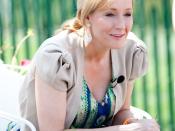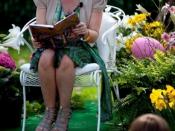Two Worlds Throughout the novels by J.K. Rowling Harry is caught between two worlds. Harry's survival and growth depend on his ability to effectively transmute the world of wizardry and the mortality of man. Harry faces conflicts with this commuting and it can effectively be related to author, J.K. Rowling. Her own life reflects the luster of a fairy tale. Facing the reality of divorce and having to care for a young child, Rowling creates the mystical, magical world of Harry Potter in order to survive psychologically and ultimately financially. Suddenly thrust into a world of single parenthood and divorce Rowling's personal situation presents the opportunity for her to face her own mortality and allows her to create a fantasy world where she could escape the harsh reality of her current life. Rowling focuses her energy on creating characters that must survive in two worlds, much the same as she has to.
She readily admits, "it was Harry Potter that rescued her". (Harry Potter) As a result, Harry's adventures and developing relationships help nurture his survival and growth throughout the novels.
Harry Potter lives with his appointed guardians, his Aunt Petunia and Uncle Vernon Dursley. Harry is trapped in this tumultuous home where he is viewed as an outsider, a weirdo, a freak. He was led to believe by the Dursleys that his parents' tragic death was a result of a car accident. In actuality his parents' death was the work of Lord Voldemort, an evil power. Harry's conflict starts at this point. After living with the Dursleys for a period of ten years he still never understood why he kept making odd things happen without meaning to do so.(Rowling, Chambe,r p.4) The Dursleys have trapped Harry in this world of unknowing and mystery due to their resentment of knowing what the wizard world can do. To the Dursleys, Harry serves as a constant reminder of the "freakish" world that his parents existed in. Therefore, Harry is treated like a caged animal. The Dursleys lock him in his room and bar his windows as to not disturb their muggle guests with his emerging magical powers. This is just the beginning of the adventure for Harry, for there is another world yet to encounter.
Harry's suspicion that he is not normal is confirmed when he is contacted by a gentle giant, Hagrid. Harry's knowledge that he is a wizard opened the door for his escape out of the present hellish atmosphere that the Dursleys have so kindly provided for him. He travels to the land of wizards via the Hogwarts Express. Hogwarts, a school for witchcraft and wizardry provides a safe haven for Harry to explore this world like no other he has witnessed. This world can be described as a secretive parallel "universe" to the muggle (human) world. Even though both exist in the same world they coincide in ways that cause controversy. According to Edward Edinger in Anatomy of the Psyche: Psychologically, the result of separatio by the division of two is awareness of the opposites. This is a crucial feature of emerging consciousness?.to the extent that the opposites remain unconscious and unseparated, one lives in a state of participation mystique, which means one identifies with one side of a pair of opposites and projects its contrary as an enemy. Space for consciousness to exist appears between the opposites, which means one becomes conscious as one is able to contain and endure the opposites within.(p.187) As Harry explores his magical being he begins to compare the two worlds and starts to reject his former life. Conflicts that arise cause great difficulty for Harry when traveling to the muggle world after living in the wizard world of Hogwarts. Harry is restricted from bringing or talking about anything in his new parallel life while in the presents of the Dursleys. Although Harry fully enjoys the new found wizard world he is forced to revert back to his former life with the Dursleys when school is out for the summer. This is what causes the confusion of how he must transmute himself from the safe wizard world to the boring muggle environment.
The torment that Harry feels while trying to exist in the two worlds gives him the initiative to delve into his origin once kept so secret. Harry must find a way to survive and grow beyond the collision of lifestyles in which he must endure. This collision becomes Harry's struggle to find out who he really is.
While at Hogwarts Harry becomes confused when he hears his parents' voices and feels Voldemort's presence through his lightning bolt scar. As he is overcome by the need to survive, he knows that when seized by dementor energy that he teeters on the edge of madness and death. He needs to become empowered to save his life (Grynbaum. 17) He seeks help from Professor Lupin, the Dark Arts teacher. When he faces the dementors one on one he musters up a patronus which takes the shape of his father's animagi, "Prongs", a valiant stag. (Rowling, Prisoner of Azkaban) This fatherly image is brought out of Harry's unconscious when he is in need of guidance.
As a step-in for Lilly and James Potter, Harry's parents, Professor Dumbledore becomes a fatherly image for Harry. Dumbledore helps Harry realize that the connections he feels toward his father come from within his own subconscious. He reassures Harry that his father is not dead by stating: "You think the dead we loved ever truly leave us? You think that we don't recall them more clearly than ever in times of great trouble? Your father is alive in you, Harry and shows himself most plainly when you have need of him." (Rowling, Goblet of Fire, p.427).
This is vital to Harry's survival and growth due to his quest for knowledge and his dependence on his father's figure to give him strength in tough situations in both worlds in which he exists.
Harry's creator, J.K Rowling, weaves a humanistic web with the fictitious character, Harry Potter. Harry grows from thinking he is a mundane muggle without parents in The Sorcerer's Stone to knowing and embracing his true origin as a wizard in The Prisoner of Azkaban. Harry effectively transmutes from the Dursleys' world to the world at Hogwarts by understanding and separating the two worlds. In a similar vein, Rowling uses her created imaginary Harry Potter world to forget her real life situation. These two worlds serve as a form of escapism for both the author and main character, Harry. They both escape to worlds either fictitious in writing or to a magical world only thought to belong to a child. Harry serves as a sort of savior for both Rowling as well as the whole wizard world. He is viewed as one that betters the situation, yet he suffers turmoil within. This type of inner battle exhibits humanistic characteristics through the detail in which the turmoil and darkness is created. Rowling portrays the feelings withheld in the form of descriptive writing and it allows the reader to draw his own conclusions about the details of Harry's world. . Harry's survival and growth is dependent on his ability to transmute the "parallel world" and back again, dealing with human-like conflicts on the way.
Bibliography Edinger, Edward. Anatomy of the Psyche. (187) As cited in San Francisco Jung Institute Library Journal: Reviews from a Jungian Perspective of Books, Films and Culture, Volume 19, Number 4, 2001, PP 17-48 Grynbaum, Gail A. "Reviews From a Jungian Perspective of Books, Films and Culture." San Francisco Jung Institute Library Journal. (2001): Number 4:Pp17-48 Rowling, J.K. Harry Potter and the Sorcerer's Stone, New York: Scholastic Press, 1997.
---. Harry Potter and the Chamber of Secrets, New York: Scholastic Press, 1999 ---. Harry Potter and the Prizoner of Azkaban, New York: Scholastic Press, 1999 ---. Harry Potter and the Goblet of Fire, New York: Scholastic Press, 2000 Harry Potter: Meet J.K. Rowling. [Online] Available http://www.scholastic.com/harrypotter/author/index.




